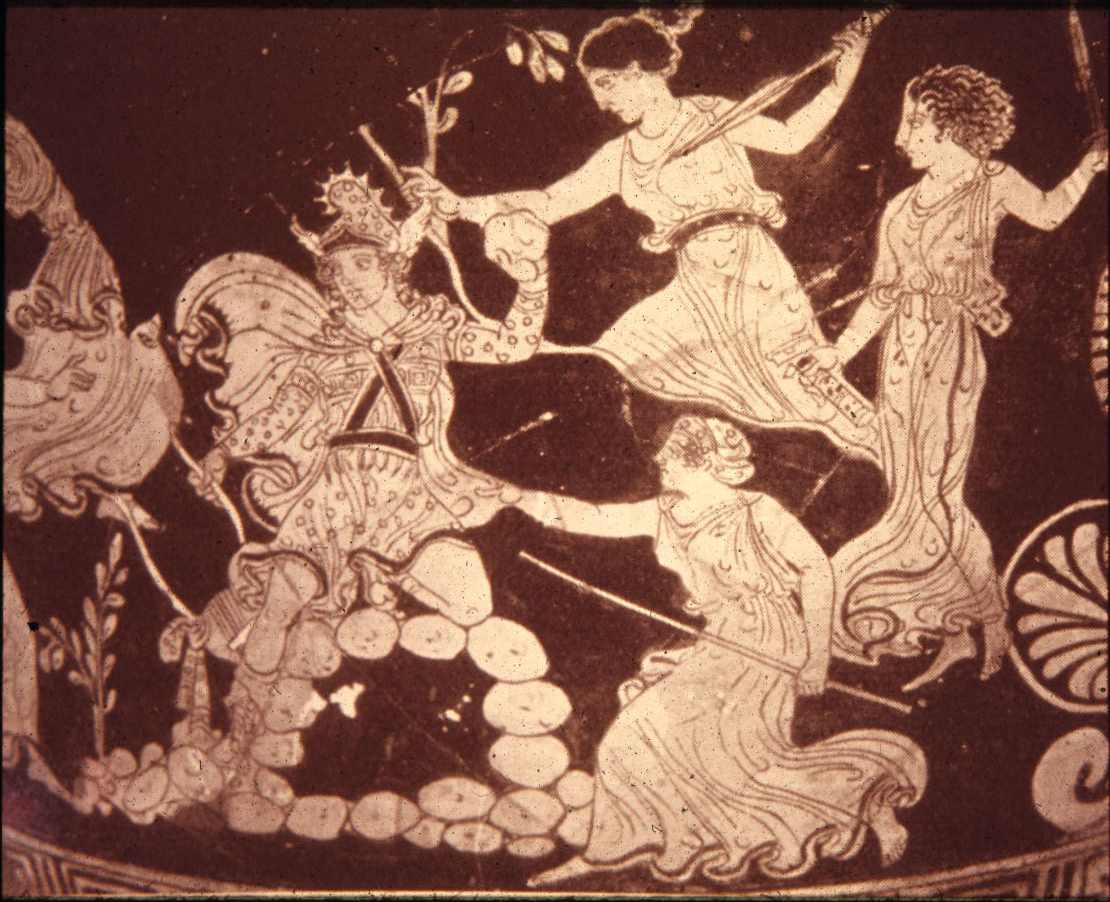 TV
TV In Which We Are Really Disappointed In David Simon
 Tuesday, June 22, 2010 at 10:22AM
Tuesday, June 22, 2010 at 10:22AM 
Dark Legacy
by ELEANOR MORROW
True Blood
creator Alan Ball
It is known to be impossible to write about The Wire. What is there to say about art that claims to be portraying every aspect of life?
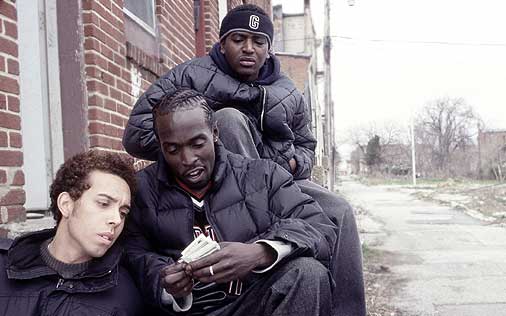
There is little space for audience participation in The Wire. Most of The Sopranos ended up being sly jokes and interpretive fun for the viewers; the kind of drama that inspires discussion in order to resolve its dilemmas. Lost required a lot of googling. The Wire required nothing of you. During The Wire, the cops were always complaining that no one got to see their point of view of what things were really like. This was extremely ironic, since the police are the subject and heroes of The Wire, with the drug dealers following shortly behind. Someone also had to win during Stalingrad.
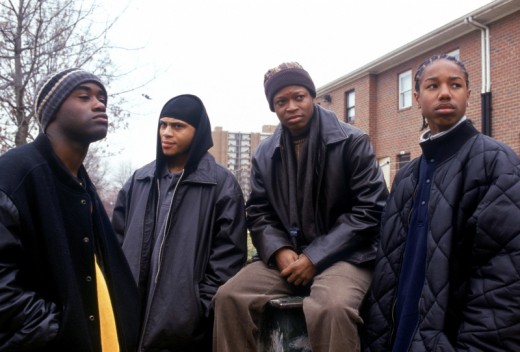 you guys...barbershop quartet??? After watching The Wire in its entirety, there is really only one appropriate response - to look at the Baltimore skyline, and think about why it really had to go down like that, and if Stringer Bell is looking at us all from heaven. My least favorite parts of The Wire are the recurring images of the city, which makes it all the more strange that David Simon would feel the need to make a series composed entirely of just that without changing any of the cast.
you guys...barbershop quartet??? After watching The Wire in its entirety, there is really only one appropriate response - to look at the Baltimore skyline, and think about why it really had to go down like that, and if Stringer Bell is looking at us all from heaven. My least favorite parts of The Wire are the recurring images of the city, which makes it all the more strange that David Simon would feel the need to make a series composed entirely of just that without changing any of the cast.
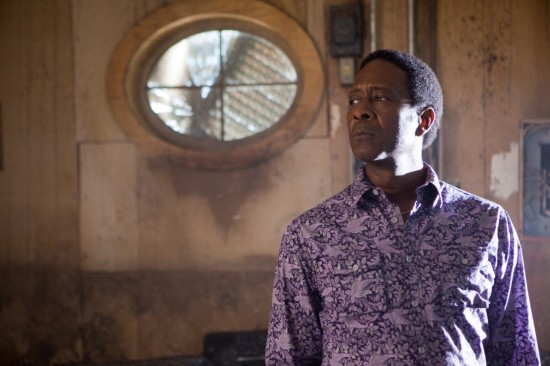 Lester got with that hooker, and everything was great, and now this But it's not just the excruciating/compelling Treme that has followed in the large footsteps of serial television's signature achievement. Although The Wire believes it knows everything about its subject (and it may be right), its fake adherence to a convincing portrait of reality masked its storytelling weaknesses. Show a young, African-American kid who doesn't want to be a drug dealer, but is. Demonstrate the untimely death of this person. Sob, rinse, repeat. The Wire got away with this because, hey, that's Baltimore.
Lester got with that hooker, and everything was great, and now this But it's not just the excruciating/compelling Treme that has followed in the large footsteps of serial television's signature achievement. Although The Wire believes it knows everything about its subject (and it may be right), its fake adherence to a convincing portrait of reality masked its storytelling weaknesses. Show a young, African-American kid who doesn't want to be a drug dealer, but is. Demonstrate the untimely death of this person. Sob, rinse, repeat. The Wire got away with this because, hey, that's Baltimore.
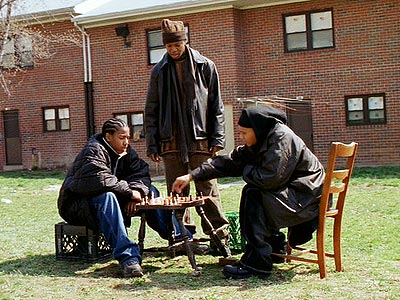 how dare you try benko's opening motherfucker As the opening scene of a light fictional documentary about the drug trade, bottoms up. As the opener to the new season of Desperate Housewives, incredibly lazy storytelling. The Wire had its most devoted audience among television writers, many of whom have adopted its techniques and adapted them for other dramatic subjects. But there's a big diffference between pretending something that never really happened, and pretending something that supposedly did.
how dare you try benko's opening motherfucker As the opening scene of a light fictional documentary about the drug trade, bottoms up. As the opener to the new season of Desperate Housewives, incredibly lazy storytelling. The Wire had its most devoted audience among television writers, many of whom have adopted its techniques and adapted them for other dramatic subjects. But there's a big diffference between pretending something that never really happened, and pretending something that supposedly did.
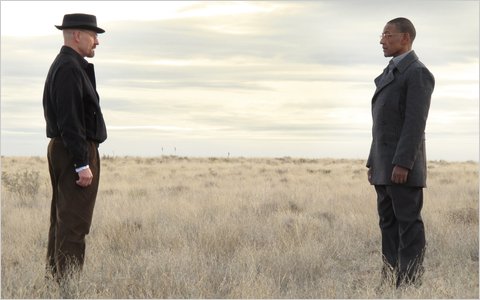
This can turn out well, as in the groundbreaking way Breaking Bad uses the techniques of fiction and documentary to maintain its crazy diegesis. And it can also turn to complete chaos, which brings us to the long-awaited third season of True Blood. No less than eighty-seven characters are featured this season, an astonishing feat when you realize six major characters died in the run-up to the end of last season. I had strongly hoped Lizzy Caplan would also be dead in Party Down so I wouldn't have to watch her reluctantly make out with Adam Scott for the twentieth straight episode. (They did the same thing with Michael Imperioli to make him seem less gay.)
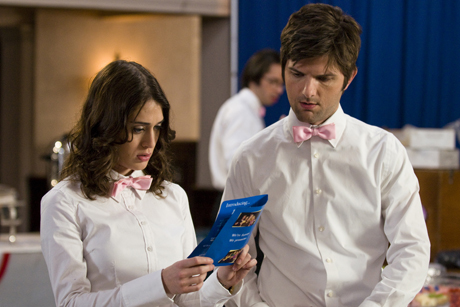 should you really be taking away from Ken Marino's screen time? The first two seasons of True Blood were slightly altered versions of Charlaine Harris' mediocre Louisiana mysteries. Now that Harris is so rich that she bought Nicolas Cage's home in New Orleans just in case Alan Ball wanted it for a set, she doesn't give two shits about Alan's ideas for changing her books. This is actually well and good, because it took Harris about five minutes (most of it spent looking at True Blood gifs) to come up with the stunningly dreadful plots of these beauties. While the books primarily focus on Sookie Stackhouse (Anna Paquin) as the primary locus for all that occurs, she's just a blonde observer on the television show.
should you really be taking away from Ken Marino's screen time? The first two seasons of True Blood were slightly altered versions of Charlaine Harris' mediocre Louisiana mysteries. Now that Harris is so rich that she bought Nicolas Cage's home in New Orleans just in case Alan Ball wanted it for a set, she doesn't give two shits about Alan's ideas for changing her books. This is actually well and good, because it took Harris about five minutes (most of it spent looking at True Blood gifs) to come up with the stunningly dreadful plots of these beauties. While the books primarily focus on Sookie Stackhouse (Anna Paquin) as the primary locus for all that occurs, she's just a blonde observer on the television show.
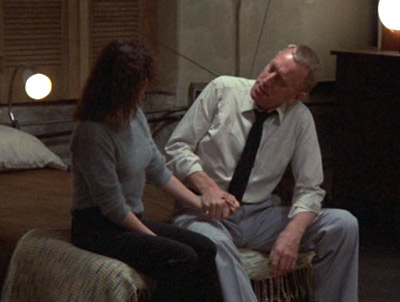
Harris' mind-reader Sookie Stackhouse never actually reads minds anymore, but that's OK. She gets a second chance to do vampires the right way this time, now that Anna Paquin and Stephen Moyer got married between seasons. Have you ever seen the part in Hannah & Her Sisters where that old guy lectures Barbara Hershey about the Holocaust documentary he watched? Their marriage is like that, but with more tolerance for elective plastic surgery. Bill Compton's facelift made his mug tighter than Eric Northman's stomach.
 remember bonanza? keep remembering it for another minute Besides the protagonist, here is the tentative list of major characters on the show, along with whether they have a convincing accent: Hoyt (no), Jessica (no), Sam (no), Tara (no), Lorena (no), Tara's mom (no), Andy (no), Jason (no), the Queen of Louisiana (no), the Magister (no), Pam (no), Eric (no), the British vampire (no), Bill (no), Arlene (no), Alfre Woodard (no), Bud (no), Terry (no), and Lafayette (yes). And I have not even included any of the werewolves.
remember bonanza? keep remembering it for another minute Besides the protagonist, here is the tentative list of major characters on the show, along with whether they have a convincing accent: Hoyt (no), Jessica (no), Sam (no), Tara (no), Lorena (no), Tara's mom (no), Andy (no), Jason (no), the Queen of Louisiana (no), the Magister (no), Pam (no), Eric (no), the British vampire (no), Bill (no), Arlene (no), Alfre Woodard (no), Bud (no), Terry (no), and Lafayette (yes). And I have not even included any of the werewolves.
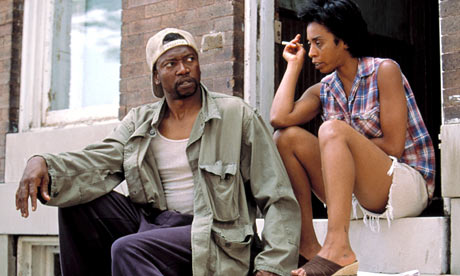 you will always be an integral member of 'Newsradio' Khandi There haven't been this many terrible accents on one television show since...The Wire. Like True Blood, The Wire was more likely to ruin an actor's chances of success in another role than help his chances. The reason for this is simple: casting relative unknowns into major roles has its benefits for the audience, but the realistic and more importantly lengthy presentation means that Bunk Moreland is forever Baltimore's best homicide detective. He's not some musician who used to be married to Khandi Alexander. Likewise, I don't believe that John Goodman knows anything about New Orleans. In fact, I know he doesn't.
you will always be an integral member of 'Newsradio' Khandi There haven't been this many terrible accents on one television show since...The Wire. Like True Blood, The Wire was more likely to ruin an actor's chances of success in another role than help his chances. The reason for this is simple: casting relative unknowns into major roles has its benefits for the audience, but the realistic and more importantly lengthy presentation means that Bunk Moreland is forever Baltimore's best homicide detective. He's not some musician who used to be married to Khandi Alexander. Likewise, I don't believe that John Goodman knows anything about New Orleans. In fact, I know he doesn't.
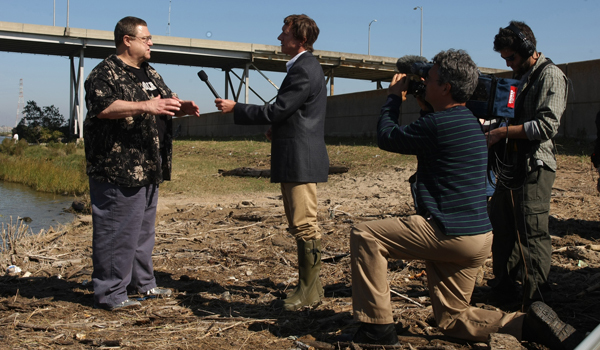 then I did Blues Brothers 2000, which was perhaps something of a misstep In this third season, Ball's version of the old story involves (shock!) conflict between vampires and werewolves. This is a really sad way for Stephenie Meyer to discover that she didn't create this dichotomy. The true story is that she just watched Underworld really late at night and assumed it was a very creative dream she was having. This is not to say we can't still enjoy what True Blood has become, more gif than mere show.
then I did Blues Brothers 2000, which was perhaps something of a misstep In this third season, Ball's version of the old story involves (shock!) conflict between vampires and werewolves. This is a really sad way for Stephenie Meyer to discover that she didn't create this dichotomy. The true story is that she just watched Underworld really late at night and assumed it was a very creative dream she was having. This is not to say we can't still enjoy what True Blood has become, more gif than mere show.

Alexander Skarsgard hasn't shown this much of his body since Coachella, and he's about to embark on a tryst with Sookie that will leave them both changed forever. As we know from the sensual and caring sex dream Sam Merlotte had about Bill Compton, after you've digested a vampire's blood, he haunts your dreams, and usually after a solid haunt, he asks for money.
What role is Skarsgard possibly going to be able to play after this show other than the villain in Gus Van Zant's shot-for-shot Die Hard remake? He's going to be Eric Northman forever.

This is why, when The Wire started getting a teensy bit bogged down by its enormous cast of characters, it could have really used a spinoff. Would anyone be disappointed that Omar had moved to West Hollywood and was still robbing drug dealers, only with a more fabulous attitude? After so much promotion that there was actually promotion of the promotion, new viewers of True Blood might be shy to handle 40 protagonists with about two antagonists.
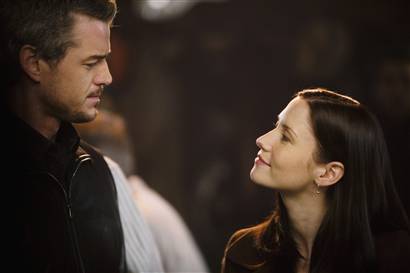 meredith, may I just say - you look GREAT Granted, it's no fun to have shows that relentlessly re-explain their premises. (All discerning people are still wondering if Ellen Pompeo realized they recast her part while she was still on Grey's Anatomy.) It is, however, worse to have a show that is incapable of explaining its original premise. I would need an L Word-style flow chart to keep track of who on the show has drunken vampire blood and can sense their feelings. This week's episode introduced about seven antagonists, none of whom were successful at harming or even unnerving the protagonists.
meredith, may I just say - you look GREAT Granted, it's no fun to have shows that relentlessly re-explain their premises. (All discerning people are still wondering if Ellen Pompeo realized they recast her part while she was still on Grey's Anatomy.) It is, however, worse to have a show that is incapable of explaining its original premise. I would need an L Word-style flow chart to keep track of who on the show has drunken vampire blood and can sense their feelings. This week's episode introduced about seven antagonists, none of whom were successful at harming or even unnerving the protagonists.

But whatever, as long as you're going to be campy, and spend half your time making inside jokes to ONTD, you should have Bill Compton ride off on the white stallion of the Queens of Mississippi. And I can't say I don't enjoy it when Bill growls and lights his maker on fire, or that I won't enjoy it when Jason Stackhouse gets bitten by Calvin Norris and turns into a werekitten. If we flashback to Eric Northman saving Anne Frank and killing John Lennon I'm going to have to respectfully switch the hour per week I spend on this show to gardening. True Blood has so much going on, that if you get bored, you can just wait for the next thing.

Eleanor Morrow is the senior contributor to This Recording. She is a writer living in Manhattan. She last wrote in these pages about Elmore Leonard and Justified.

"Simian Fever" - Six Finger Satellite (mp3)
"Pulling A Train" - Six Finger Satellite (mp3)
"White Queen to Black Knight" - Six Finger Satellite (mp3)
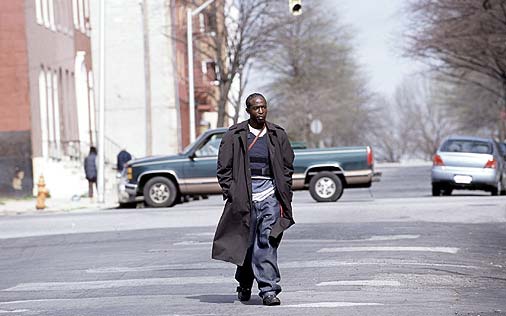
Loving You Always Omar
ATTORNEY: Mr. Little, how does a man rob drug dealers for eight or nine years and live to tell about it?
OMAR: Day at a time I suppose?

 breaking bad,
breaking bad,  eleanor morrow,
eleanor morrow,  the wire,
the wire,  true blood
true blood 














































